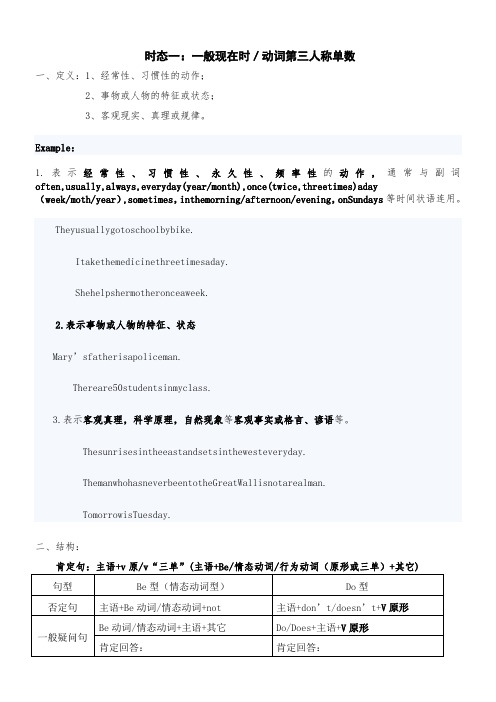一般现在时及三单(综合)
初中一般现在时及三单动词的变化规则

初中一般现在时及三单动词的变化规则
一般现在时的构成:
肯定句:主语+动词原形+其他成分
否定句:主语 + do/does not + 动词原形 + 其他成分
疑问句:(特殊疑问词) + do/does + 主语 + 动词原形 + 其他成分三单动词的变化规则:
一般现在时第三人称单数的动词变化规则是在动词原形末尾加上 -s 或 -es。
大多数动词直接在原形后加-s:
例如:play → plays
study → studies
以 -sh, -ch, -s, -x, -o结尾的动词,在原形后加 -es:
例如:watch → watches
teach → teaches
miss → misses
fix → fixes
do → does
其他一些特殊情况:
以辅音字母+y结尾的动词,将y变为i,再加-es:
例如:fly → flies
study → studies
以元音字母+y结尾的动词,直接加-s:
例如:play → plays
enjoy → enjoys
以-o结尾的动词,大多数加-es:
例如:do → does
go → goes
但也有例外,像是have、go这些常用的动词变化为has和goes。
需要注意的是,不可数名词和第三人称单数主语时,一般现在时动词不变化,依然使用动词原形:
例如:Water boils at 100 degrees Celsius.
She sings beautifully.。
小学英语一般现在时三单动词的变化规则及练习题

在句子中,一般现在时三单动词的变化规则可以用来描述事实、表达观点 或传达信息。
通过使用一般现在时三单动词的变化规则,可以使句子更加简洁、明了, 易于理解。
在英语学习中,掌握一般现在时三单动词的变化规则在实际中的应用非常 重要,可以提高语言表达能力。
一般现在时三单 动词的变化练习
题
单选练习题
一般现在时态中,动词第三人称单数的变化规则是:A. 动词原形 B. 动词+s C. 动词+es D. 动词+ing
下列句子中,动词形式正确的是:A. He like playing basketball B. She goes to school at 7:00 every day C. They like to eat apples D. We don't like to play in the rain
在日常交流中的应用
描述日常行为和习惯
表达经常发生的动作或状态
描述事物的性质和特征
表达个人的喜好和意愿
在写作中的应用
描述日常行为和习惯
表达个人观点和喜好
描述事件和经历
编写故事和虚构情境
感谢您的观看
汇报人:XX
下列句子中,动词形式不正确的是:A. He plays basketball every day B. She eats an apple every morning C. They like eat apples D. We don't like to play in the rain
下列句子中,动词形式正确的是:A. He doesn't like to eat vegetables B. She doesn't like playing the piano C. They don't like to read books D. We don't like eating apples
一般现在时动词三单变化规则

一般现在时动词三单变化规则
1. 对于大多数动词,第三人称单数加上-s或-es。
例如:play → plays, watch → watches。
2. 对于以s, sh, ch, x, z结尾的动词,第三人称单数在词尾加-es。
例如:pass → passes, brush → brushes。
3. 对于以辅音字母加y结尾的动词,将y变为i,再加上-es。
例如:fly → flies, study → studies。
4. 对于以元音字母加y结尾的动词,直接加上-s。
例如:play → plays, enjoy → enjoys。
5. 对于以辅音字母加o结尾的动词,通常在词尾加-es。
例如:do
→ does, go → goes。
但也有例外,如:go → goes。
6. 仅有少数几个动词在第三人称单数形式不变。
例如:have → has, do → does。
值得一提的是,对于be动词,第三人称单数形式是is。
例如:I am, he is。
一般现在时及动词的三单形式和主格复习

原型do do(做,干) 三单形式 does
主语为第三人称单数时, 动词用第三人称单数形式.
I,you,we,they
he,she,it
当你说出的这句话表示目前(现在)这段时期经常 发生的状态或动作,句子时态要用一般现在时,动 词为原型
动词第三人称单数的变化规则 Let’s Talk
This is ...
We play ___ (play) football. Hegoes ___ (go) to school at seven. ___ he go to school at seven? Does ___ you have lunch at twelve? Do
实意动词的第三人称单数形式
主语为第一人称单数或复数,第二人称单数或复数时,第三人称复数 时,动词用原型
1、直接在动词后+s like- likes play-plays
He/ She is good at ... He / She is ...
2、以s, x, sh, ch, 接尾的动词:+es wash-washes
3、以辅音+o接尾的动词:+es go-goes 4、以辅音+y接尾的动词:变y为i+es
不规则变化:have-----has
Thank You!
L/O/G/O
动词短语: Let’s Talk
This is ... skips, He/ She is good atstarts, ... Helikes, / She is ... +s: Plays, sings, gives, buys some toys, gets up comes back home makes noodles, eats lunch drinks coffee begins his class , practises the piano +es : watches TV brushes his teeth goes to bed goes to school does my homework does some reading y→ i+ es: fly → flies study →studies
一般现在时及三单(综合)

时态一:一般现在时/动词第三人称单数一、定义:1、经常性、习惯性的动作;2、事物或人物的特征或状态;3、客观现实、真理或规律。
Example:1.表示经常性、习惯性、永久性、频率性的动作,通常与副词often,usually,always,everyday(year/month),once(twice,threetimes)aday二、结构:肯定句:主语+v原/v“三单”(主语+Be/情态动词/行为动词(原形或三单)+其它)否定句:主语+Be/情态动词/do/dose+not+其它一般疑问句:Be/情态动词/do/dose+主语+其它特殊疑问句:特殊疑问词+Be动词/情态动词/do/dose+主语+其它(对主语提问除外)对主语提问的特殊疑问句=特殊疑问词+主语+动词原形/三单(肯定句的结构)+?Thisbookisyours.这本书是你的。
Thatcarisred.那辆小汽车是红色的。
ThecatisLucy's.这只猫是露茜的。
4、不定代词someone,somebody,nobody,everything,something等及指示代词this,that作主语时,是第三人称单数。
如:Everyoneishere.大家到齐了。
Thereissomethingwrongwiththewatch.这块手表有毛病。
Thisisapen.这是一支钢笔。
Thatisaneraser.那是一块橡皮擦。
5、不可数名词作主语时为第三人称单数。
如:Themilkisintheglass.牛奶在玻璃杯里。
Thebreadisverysmall.那面包很小。
6、当数字或字母作主语时,看作第三人称单数。
如:"6"isaluckynumber."6"是个吉利数字。
练习一:一般现在时/三单的练习题(一).用动词的适当形式填空1.She_________(go)toschoolatseveno’clock.改为一般疑问句:5.IwatchTVeveryday.改为一般疑问句:6.Davidhasgotagoal.改为一般疑问句:7.Wehavefourlessons.否定句:8.Nancydoesn’trunfast肯定句:9.Mydogrunsfast.否定句:一般疑问句:10. Mikehastwolettersforhim.一般疑问句:否定句:11. Iusually(playfootball)onFridayafternoon.否定句:一般疑问句:☆通过下列练习,你能否找到一些可用的规律?肯定句1.We_____(play)footballeveryday.2.Jim_____(want)anorange.3.Mymother______(watch)TVintheevening.4.She______(know)alittle(一点儿)English.5.Myfatheralways________(come)backfromworkverylate.6.Theteacherisbusy.He________(sleep)sixhoursaday.7.Thegirl_______(like)wearingaskirt.8.We_____(go)toschoolat7:30inthemorning.9._______Mike_______(read)Englisheveryday?10._______she_______(do)thehouseworkeveryday?11._______she_______(like)playingtheviolin?Yes,she_______(do).12._______they_______(like)theWorldCup?特殊疑问句1.Whatcolor_______yoursister_______(like)?2.Where_______you_______(have)luncheveryday?3.Whattime_______hisfather_______(do)thework?4.What_______(do)heusually_______(do)afterschool?5.Howmanylessons_______yourclassmates_______(have)onMonday?12.—_________________________________________________________________4.Amyli kesplayingcomputergames.(改为一般疑问句,并作否定回答)_________________________________________________________________5.Wegot oschooleverymorning.(改为否定句)_________________________________________________________________6.HespeaksEnglishverywell.(改为否定句)_________________________________________________________________7.Ilike takingphotosinthepark.(对划线部分提问)_________________________________________________________________8.Johnc omesfromCanada.(对划线部分提问)chTVeveryday.(改为一般疑问句)_________________________________________________________________16.Davi dhasgotagoal.(改为一般疑问句)_________________________________________________________________17.Weha vefourlessons.(改为否定句)__________________________________________ 18.Nancydoesn'trunfast.(改为肯定句)__________________________________________ 19.DanielwatchesTVeveryevening.(改为否定句)__________________________________________否定回答:对划线部分提问(特殊疑问句):3.Theyareonthechair.否定句:一般疑问句:肯定回答:否定回答:对划线部分提问(特殊疑问句):4.Thereisabirdinthesky.否定句:一般疑问句:肯定回答:否定句否定句7.Lilyhasablackball.否定句:一般疑问句:肯定回答:否定回答:对划线部分提问(特殊疑问句):8.Myfriendslikesapples.否定句:一般疑问句:肯定回答:否定回答:对划线部分提问(特殊疑问句):。
一般现在时动词三单变化规则

一般现在时动词三单变化规则一般现在时是英语语法中最基本的时态之一。
当我们谈论一种普遍的情况、习惯或者说一个真理时,我们都会用到这个时态。
在一般现在时中,动词的变化分为两种情况:一是非第三人称单数,二是第三人称单数。
一、非第三人称单数的动词变化规则:在非第三人称单数时,大多数动词的变化规则是在动词原形后面加上s或es,这取决于动词的结尾是什么。
如:I like to swim.(我喜欢游泳。
)She works hard.(她工作努力。
)They play tennis every weekend.(他们每周末打网球。
)但是,当动词的结尾是s, x, z, ch, sh等半元音或辅音加上o 时,要在动词原形后面加上es。
如:He goes to school every day.(他每天去学校。
)She fixes her bike herself.(她自己修自行车。
)The boss buzzes around the office.(老板在办公室里四处走动。
)二、第三人称单数的动词变化规则:在第三人称单数时,大多数动词的变化规则是在动词原形后面加上s或es,这取决于动词的结尾是什么。
如:He runs every morning.(他每天早上跑步。
)She reads a book before bed.(她睡前看一本书。
)The cat eats fish.(猫吃鱼。
)但是,当动词的结尾是s, x, z, ch, sh等半元音或辅音加上o 时,要在动词原形后面加上es。
另外,以辅音+y结尾的动词,要改为以i结尾,再加es。
如:He goes to school every day.(他每天去学校。
)She fixes her bike herself.(她自己修自行车。
)The boss buzzes around the office.(老板在办公室里四处走动。
)He studies hard every day.(他每天努力学习。
一般现在时及三单
一般现在时及三单时态一:一般现在时/动词第三人称单数、经常性、习惯性的动作;一、定义:1、事物或人物的特征或状态;2、客观现实、真理或规律。
3:Exampleusually, often, 、频率性的动作,通常与副词xx1. 表示经常性、习惯性、always, every day (year/ month ), once (twice, three times) a day on ,,in themorning/afternoon/eveningweek/moth/year(), sometimes 等时间状语连用。
SundaysThey usually go to school by bike.I take the medicine three times a day.She helps her mother once a week.2.表示事物或人物的特征、状态Mary's father is a policeman.There are 50 students in my class.3. 表示客观真理,科学原理,自然现象等客观事实或格言、谚语等。
The sunrises in the east and sets in the west every day.The man whohas neverbeen to the Great Wall is not a real man.Tomorrow is Tuesday. 一般现在时及三单二、结构:肯定句:主语 + v原 /v“三单” (主语+ Be/情态动词/行为动词(原形或三单)+其它)否定句:主语+Be/情态动词/do/dose+not+其它一般疑问句:Be/情态动词/do/dose + 主语+其它特殊疑问句:特殊疑问词 + Be 动词/情态动词/do/dose + 主语+其它(对主语提问除外)对主语提问的特殊疑问句= 特殊疑问词+主语+动词原形/三单(肯定句的结构)+?总结:行为动词表示具体的动作,be动词表示状态,情态动词表示态度。
三单形式用法总结
三单形式用法总结
在英语中,三单形式是指动词在第三人称单数时的变化形式。
一般情况下,加上 -s 或 -es 后缀。
以下是三单形式的用法总结。
1. 一般现在时
在一般现在时中,当主语为第三人称单数时,动词需要加上 -s 或 -es 后缀。
例如:
- She likes to read books.
- He eats breakfast every day.
2. 情态动词
情态动词本身没有三单形式,因为它们不受主语的人称和数的影响。
例如:
- She can speak French fluently.
- He should study harder for the exam.
3. 动词 be
在动词 be 中,第三人称单数需要使用 is。
例如:
- She is a teacher.
- It is raining outside.
4. 动词 have
在动词 have 中,第三人称单数需要使用 has。
例如:
- She has a cat.
- He has been to Japan twice.
5. 不规则动词
有些不规则动词在第三人称单数时需要进行变化。
例如:
- He goes to school every day.
- She does her homework after dinner.
- It rains a lot in this city.
总之,在英语中使用正确的三单形式是非常重要的。
通过掌握以上几种用法,可以更好地运用英语表达自己的意思,并避免犯错。
一般现在时语法+三单精讲
一般现在时语法+三单精讲一般现在时精讲一、什么是一般现在时:一般现在时:表示经常性的事情,经常性的动作或一般性事实。
结构:主语+动词(单数或者复数根据主语决定)二、什么时候用一般现在时:1. 当句子表示客观真理,客观存在,科学事实时:The earth moves around the sun.Shanghai lies in the east of China.2. 当句子是名言警句时:Pride goes before a fall.骄者必败。
3. 当句子表示现在时刻的状态、能力、性格、个性:I don't want so much.Ann Wang writes good English but does not speak well.4. 当句子中出现了时间标志语:(1)表示频度的副词或词组always ,often, usually, sometimes,once a year等(2)every day, in the morning, every year,at …在几点钟等时间状语三、一般现在时怎么用:当句子符合上面任何一种情况,则句子采用一般现在时,这时候动词要开始改变啦,兵分2路改变:大部队一路:当主语是第三人称单数时:1、动词变成相应的第三人称单数形式(动词的复数形式)2、肯定句:主语+动词复数+其它3、否定句:主语+doesn't+动词原形+其它(其中的does代表动词的复数,不代表没有任何意义)4、一般疑问句:Does+主语+动词原形+其它?5、肯定回答:Yes,主语+does6、否定回答:No,主语+doesn't7、特殊疑问句:特殊疑问词+一般疑问句?(一般疑问句中用does)小分队一路:当主语不是第三人称单数时:1、动词不变成相应的第三人称单数形式(动词不用变成复数)2、肯定句:主语+动词原形+其它3、否定句:主语+don't+动词原形+其它(其中的do代表动词的单数,不代表没有任何意义)4、一般疑问句:Do+主语+动词原形+其它?5、肯定回答:Yes,主语+do6、否定回答:No,主语+don't7、特殊疑问句:特殊疑问词+一般疑问句?(一般疑问句中用do)总结起来就是这样的一般现在时的结构肯定式疑问式否定式否定疑问式I work. Do you work? I don't work. Don't you work?You work. Do you work? You don't work. Don't you work?We work. Do you work? We don't work. Don't you work?They work. Do they work? They don't work. Don't they work?Doesn't he(she it)He(She,It) works. Does he(she,it) work? He(She,It) doesn't work.work?四、那么,动词如何变成复数呢:三单变化:(1)直接在动词词尾加-s.ask---asks work---works get---gets stay---stays(2)以字母s, x, ch, sh或o结尾的动词,在词尾直接加-es.watch---watches wish---wishes fix---fixes do---doesgo---goes pass---passes(3)以“辅音字母加- y”结尾的动词,要先变y为i再加-es.try---tries study---studies cry---cries fly---flies情况构成方法读音例词一般情况加-s 清辅音后读/s/ 浊辅音和元音后读/z/swim-swims;help-helps;like-likes以辅音字母+o结尾的词加-es 读/z/ goes,does以s,sh,ch,x等结尾的词加-es 读/iz/ watches,washes 以辅音字母+y结尾的词变y 为i再加es 读/z/ study-studies不规则变化have 和be动词变have 为has变be为am,is,arehave-has be-am,is,are一般现在时专项练习一、考点/易错点1动词变形有误1 He __ football very well.2 Danny __ to school at 7:10.答案:1 plays 2 goes plaies, gos解析:1以辅音字母加y结尾的动词变单三人称形式才能把y换成i再加es;2与名词变复数不同,变单三人称形式以o结尾的词要加es.考点/易错点2对主语判断有误例:This book __mine答案: is解析: 书是属于“它(it)”的范围,是无生命的它,所以也是三单。
一般现在时-动词三单练习
一般现在时------动词三单一般现在时的肯定句中,主语为第三人称单数的动词变化主要体现在词尾的变化上,其规律大体有三点:(1) 一般情况下由动词后加-s构成。
如work / works(2) 以s, x, z, sh, ch 以及字母o结构的动词,后加-es:guess / guesses, mix / mixes, go / goes, buzz / buzzes, finish / finishes, catch / catches等。
(3) 以辅音字母加y结尾的动词,应将y改为i 再加-es:fly / flies, study / studies等。
附:①有个别的变化不规则,如have / has, be / is等。
②词尾-s和-es 读音规则是:在s, x, z, sh, ch 后的es读作[iz],其余的读作[z]Exercise 练习一、写出下列动词的第三人称单数drink________ go ____ ___ stay ________ make _ ___ __ look _________ have____ ___ push___ ____ carry _______ come________ watch______ read_____ __ fly ________ study_______ brush________ do_________ teach_______ drive _______ work _______ help______ take ______like _______ draw _______ write ______ find _______二.用括号内动词的适当形式填空。
1.He often ________(have) dinner at home.2.______ (do) they ________(like) reading stories?3.What _______(do) they often _______(do) on Saturdays?4._______(do) your parents _______(read) newspapers every day?5.The girl _______(teach) us English on Sundays.6.She and I ________(take) a walk together every evening.7.Mike _______(like) cooking.8.They _______(have) the same hobby.9.He can_______(do) his homework well.10.My father is a factory worker. He ______(make) toy cars.11.She _______(go) to school from Monday to Friday.12.The boy often _______(watch) TV in the evening.13.Su Hai and Su Yang _______(have) eight lessons this term.14.He _________(read) English every day.15.We _________(go)to school at seven in the morning.16.Mike________(go)to school at seven in the morning.17.My mother________(like) ______(go) shopping.18.I can ________(draw) many beautiful pictures.19.She_________(make) a model plane.20.Do you ________(like)_________(run)?。
- 1、下载文档前请自行甄别文档内容的完整性,平台不提供额外的编辑、内容补充、找答案等附加服务。
- 2、"仅部分预览"的文档,不可在线预览部分如存在完整性等问题,可反馈申请退款(可完整预览的文档不适用该条件!)。
- 3、如文档侵犯您的权益,请联系客服反馈,我们会尽快为您处理(人工客服工作时间:9:00-18:30)。
时态一:一般现在时/动词第三人称单数一、定义:1、经常性、习惯性的动作;2、事物或人物的特征或状态;3、客观现实、真理或规律。
Example:1. 表示经常性、习惯性、永久性、频率性的动作,通常与副词often, usually, always, every day (year/ month ), once (twice, three times) a day(week/moth/year), sometimes,in the morning/afternoon/evening,on Sundays等时间状语连用。
They usually go to school by bike.I take the medicine three times a day.She helps her mother once a week.2.表示事物或人物的特征、状态Mary’s father is a policeman.There are 50 students in my class.3. 表示客观真理,科学原理,自然现象等客观事实或格言、谚语等。
The sun rises in the east and sets in the west every day.The man who has never been to the Great Wall is not a real man.Tomorrow is Tuesday.二、结构:肯定句:主语 + v原 /v“三单” (主语+ Be/情态动词/行为动词(原形或三单)+其它)否定句:主语+Be/情态动词/do/dose+not+其它一般疑问句:Be/情态动词/do/dose + 主语+其它特殊疑问句:特殊疑问词 + Be 动词/情态动词/do/dose + 主语+其它(对主语提问除外)对主语提问的特殊疑问句= 特殊疑问词+主语+动词原形/三单(肯定句的结构)+?总结:行为动词表示具体的动作,be动词表示状态,情态动词表示态度。
在做肯定述的时候,运用的规则是:有do无be;无do一定要加be。
另外,一定要小心:在做句型转换(否定、疑问)的时候,要分别遵守自己的约定:行为动词要请do/does帮忙;有be就直接用be(be提前变成问句,在后面加上not变成否定句)。
三、第三人称单数(三单)1、除了我(I )和你(you ) 我们(we)你们(you) 他们(they) 之外都是三单,人称代词he, she, it是第三人称单数。
如:He likes watching TV. 他喜欢看电视。
She has lunch at twelve. 她十二点吃午餐。
It looks like a cat. 它看起来像只猫。
2、单个人名、地名或称呼作主语;是第三人称单数。
如:Han Mei looks like her mother. 梅看起来像她的母亲。
Beijing is in China. 在中国。
Uncle Wang often makes cakes. 王叔叔经常做蛋糕。
3、单数可数名词或"this / that / the+单数可数名词"作主语时,是第三人称单数。
如:A horse is a useful animal. 马是有用的动物。
This book is yours. 这本书是你的。
That car is red. 那辆小汽车是红色的。
The cat is Lucy's. 这只猫是露茜的。
4、不定代词someone, somebody, nobody, everything, something等及指示代词this, that作主语时,是第三人称单数。
如:Everyone is here. 大家到齐了。
There is something wrong with the watch. 这块手表有毛病。
This is a pen. 这是一支钢笔。
That is an eraser. 那是一块橡皮擦。
5、不可数名词作主语时为第三人称单数。
如:The milk is in the glass. 牛奶在玻璃杯里。
The bread is very small. 那面包很小。
6、当数字或字母作主语时,看作第三人称单数。
如:"6" is a lucky number. "6"是个吉利数字。
"I" is a letter. "I"是个字母。
四、动词三单变化规则1、一般情况下加S :ask---asks learn----learns work---works get---gets like—likesplay—plays stay---stays2、以“s, x, ch, sh,o”结尾的,在词尾加“es”:teach-teaches wash----washes go-goes do-does3、以辅音字母加“y”结尾的,先将“y”变为“i”,然后在加“es”:study-studies fly-flies cry---cries try---tries carry-carries worry-worries4、以元音字母加Y的,直接加S,(此种情况可直接归入第1类)如say—says5、记住3个特殊的:Be动词(is are)的三单-ishave的三单-hasDo的三单—does五、句型转换一、述句变一般疑问句、否定句1、Be型、情态动词型否定句:直接在be动词或情态动词后面加not.疑问句:则把be动词或情态动词(can,could等等)提到主语的前面例:①述句:She is a student.疑问句→ Is she a student?否定句→ She is not a student.②述句:I can swim.疑问句→ Can you swim?yes,I can. No,I can’t.否定句→ I can not swim.2、Do型否定句:主语 + don’t/ doesn’t + 谓语动词原形疑问句:Do / Does + 主语 + 动词原形例:①述句:We get up at 7:00 every morning.否定句→We don’t get up at 7:00 every morn ing.疑问句→Do you get up at 7:00 every morning?②述句:She has a little brother.否定句→ She doesn’t have a little brother.疑问句→ Does she have a little brother?3、注意“变变变变”(1)I、we—>you、you(2)句号变问号;(3)Does(三单)、Did(过去式)来帮忙,动词变V原;(4)some->any something->anything somebody-> anybody already->yet too->eitherboth->neither all->noneeg:Are you from Japan﹖ Yes, I am. / No, I'm not.Is her sister doing her homework now﹖ Yes, she is. / No, she isn't.Does he work in a bank﹖ Yes, he does. / No, he doesn't.Do you live near your school﹖ Yes, I do. / No, I don't.Can you speak French﹖ Yes, I can. / No, I can't.May I go home now﹖ Yes, you may. / No, you mustn't.二、述句变特殊疑问句(不能用yes/no回答的疑问句)1、常见的疑问词when:问时间 (回答用At/ On...等)where:哪里(状语)who :谁 ( 回答用He is...She is... They are...等)whom:谁(宾格)whose:谁的 (回答用It is.. These/Those are等)what :什么How:怎么样(对近况提问,回答用形容词,问程度)which:哪一个,哪个why:为什么 (回答用Because,问原因)记法:特殊疑问词的开头一般是wh或h;注意:特殊疑问句一般读降调(↓)常见的疑问短语what time:问时间点what color:什么颜色(表语)what weather:什么天气what subject:什么学科what job:什么职业what nationality:对国籍提问what kind:哪一种类型-How fast:多快(速度)How many:多少数量(可数)How much:多少钱价格(不可数)How long:多长(可用于时间,问做多长时间)How often:多少次(问频率)(频率副词)How far:多远路程How soon:多久How old:多少岁2、特殊疑问句有两种语序:(1)如疑问词作主语或主语的定语,即对主语或主语的定语提问,其语序是述句的语序:Who is singing in the room﹖whose bike is broken﹖(2)如疑问词作其他成分,即对其他成分提问,其语序是:特殊疑问词+一般疑问句【即:特殊疑问词+be/助动词/情态动词+主语+谓语】What does she like?What class are you in﹖Where are you from﹖What time does he get up every morning﹖How do you know﹖(3)就划线部分提问解题方法:一换二变三提前一换:找出正确的疑问词或词组替换划线部分什么东西->what, 地点->where 时间->when, 怎么样->how多少->how many(可数) how much(不可数)动作划线->看形式,然后选择助动词,做的事情用 whatEg: They read English books in the afternoon. WhatThey read English books in the classroom every day. Where They read English books in the classroom in the morning. When I have got five books. How manyI go to school by bike every day. HowTom sings songs in the living room every evening. does what We read books every day. do what二变:将替换完的句子根据规则变为一般疑问句eg: Tom swims in the pool every day.Tom does what in the pool every day.Does Tom do what in the pool every day?三提前:将变完的一般疑问句中的特殊疑问词提前eg: Does Tom do what in the pool every day?What does Tom do in the pool every day?注意:I like taking photo in the park.I like doing what in the park.What do you like doing in the park?练习一:一般现在时/三单的练习题(一).用动词的适当形式填空1. She _________(go) to school at seven o’clock.2. It’s 6o’clock. They are _________ (eat) supper.3. He usually ___________ up at 17:00.(get )4. She ___________ (live) in Beijing.5. Amy _________ (be) here just now.6. _______ (be)there a fly on the table just now?7. My father __________ (watch) TV every evening .8. My father _______________ (make) toys these days.9.________ Amy _________ (read) English every day?10. Chen Jie sometimes _________(go)to the park with her sister.(二).选择填空1.I want____homework now. A. doing B. to do C. to do my D. do my 2.It's time______.A. go to schoolB. play gamesC. to go homeD. to do my homeworks3.______go and help her. A. Let's me B. Let's us C. Let's D. Let's to4.Do they have a new car? Yes,_____.A .they are B.they have C. they don't D. they do5.He often _________ supper at 6:00 in the evening.A. haveB. has c. is having D. is eating6. We _____________ any Chinese classes on Friday.A. are havingB. aren’t havingC. don’t haveD. are have(三)、用括号动词的适当形式填空。
